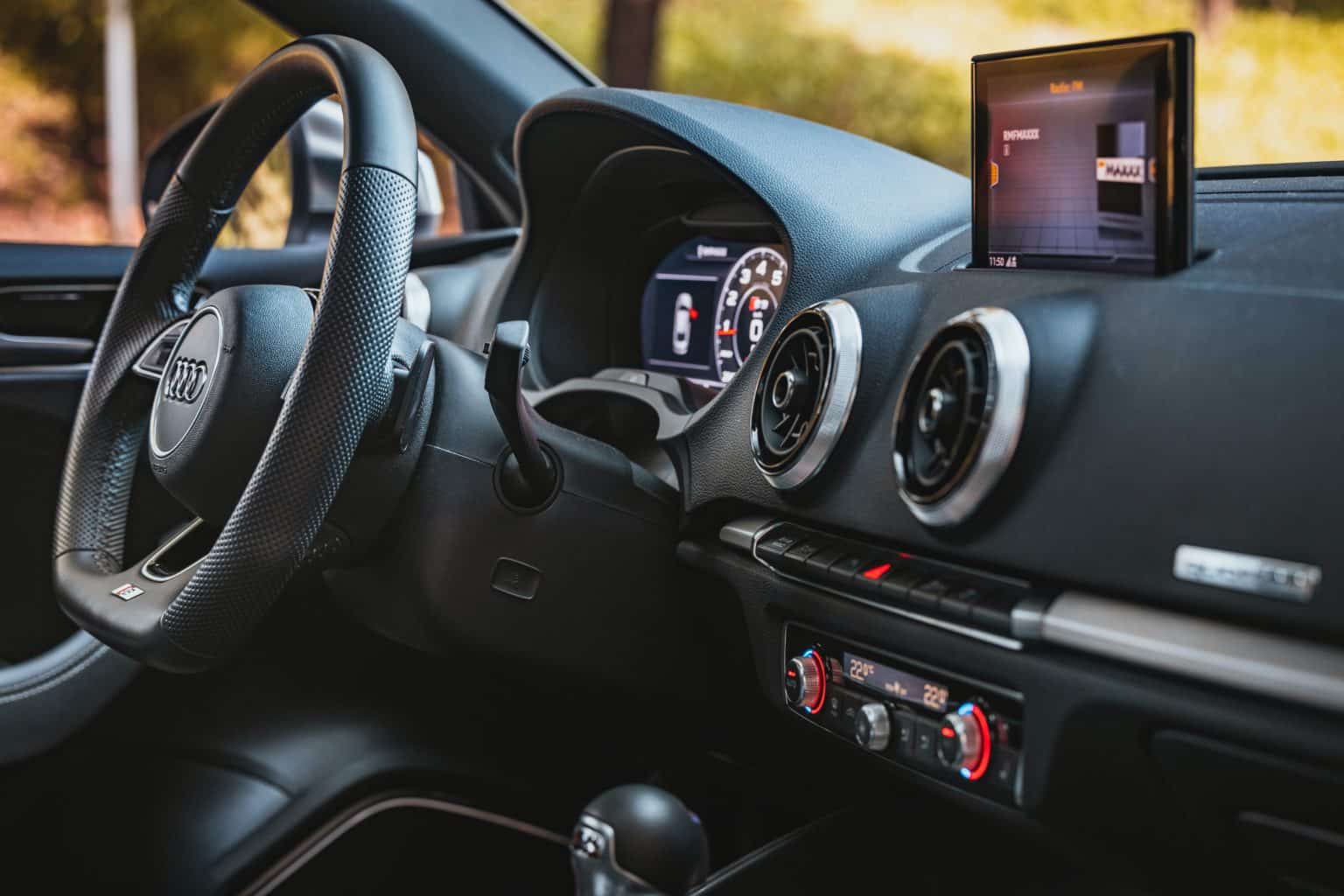
Noise When Turning Steering Wheel While Stationary
Have you ever heard an odd noise when turning steering wheel while stationary?
Don’t worry if this happens to you.
You’re not alone in finding this strange phenomenon.
Many drivers have heard of this strange sound and frequently inquire about its cause.
When you’re stopped, you might hear a cracking or hissing sound emanating from your steering, but it may also indicate issues with fluid levels in the system (bad bearings), leaks at various parts including joints, and shocks that don’t allow air to flow freely through them properly as well as worn-out tires making noise on the pavement.
The most frequent reasons for this sort of issue are a lack of liquid near the servo motor that controls the wheel, as well as missing or jammed gears rubbing against one another while traveling down the road.

What is Steering and How Does It Work?
When you drive your car, the steering wheel goes through a sequence of gears and connections linked to the front wheels.
The more turns made in either direction (clockwise or counter-clockwise), the greater the length of those links, which subsequently affects how much strength there is on each component when they reconnect at speed!
Steering wheels are important because they allow you to change the direction that you wish to go.
These gears within your vehicle’s hub spin when one rotates left or right, which causes your car’s front tires to turn accordingly!
This also aids in forwarding/backward movement based on how far our eyes travel when we look down from the driver’s seat.

Possible Causes of Noise
When driving in a parked vehicle, there are several sources of noise.
Let’s have a look at some of them:
Bad Steering Wheel Bearing Noise
The sound of your steering wheel turning is an indication that the bearings may need to be replaced.
This can cause some noise, but more importantly, it will make driving much less comfortable for you because this type of issue often leads to other more serious problems with cars.
Gears That Are Damaged Or Misaligned
One indication that your automobile requires servicing is the sound of its wheels turning.
Grinding or squeaking might be a sign of an alignment issue and damage to certain components, which would cause them to make noises when turned hard!
Tires That Have Been Used Up
Your vehicle’s tires are a significant investment, and they may make or ruin your trip.
Make sure that you have enough air in them by looking for leaks all-around before leaving town so that this problem doesn’t reoccur!
Fluid Quality Is Poor
A loud whirring or whining sound coming from your steering wheel when turning it too far may be a sign that the fluid level in between turns has dropped.
Check for leaks and top off as soon as possible!
Leaks Consistently
When you turn the steering wheel, you may hear a hissing sound that indicates there may be a leak in your vehicle’s system.
The sound of air escaping through tiny gaps or cracks can frequently lead to As soon as we consider this issue, addressing it becomes a top priority!
Poor Steering Rack
If your automobile’s steering rack is out of whack, it will make a deafening clunking noise when you turn the wheel.
Level Of Steering Fluid Is Low
Low-level steering fluid may make a noise when turning the wheel.
It’s possible that your vehicle’s Steering System is running low on fluids and needs to be filled right away if it makes a high-pitched whirring sound when you turn the wheel!
Steering Fluid Bubbles
On a regular basis, check for bubbles in your steering fluid to ensure that the wheel does not make a loud popping noise when turned.
Bad Steering Belt
When you spin the knob, the liquid may make a popping sound and if there are bubbles in it, they might be transparent or barely visible.
Bad Steering Wheel
If your vehicle’s steering wheel makes an annoying noise when you turn it, there might be a problem with the gearbox.
The sound of metal scraping against concrete may be heard inside or outside our cars.
Power Steering Pumps That Are Dirty or Blocked
The power steering pump is another frequent source of noise when turning the steering wheel while stationary.
This high-pressure fluid helps control movement in your vehicle’s wheels as they rotate around curves and over bumps on rough roads, so it comes into touch with dirt/grime from other components within our automobile engine system!
What Is A Stationary Steering Sound And How Do I Fix It?
Checking your tires for wear or damage when you hear engine noise while stopped is a good idea.
A flat tire can produce unwanted vibrations on the vehicle’s structure, which may cause this problem!
Steering problems may affect any car.
It’s critical that you and other drivers who may be driving with us tomorrow morning or afternoon keep your eyes open!
The best approach to discover these issues is to examine each tire for signs that it has not been properly worn or maintained.
If the treads are bulging/bald regions on them, this might be a sign of uneven pressure distribution within them due to poor maintenance procedures or low-quality materials used during production (an important feature when driving at high speeds).
The axles are frequently the first components to fail on your automobile, therefore it’s a good idea to check for visible damage.
You may quickly replace almost anything else but these will not be fixable due to this severe cosmetic problem!
If your auto is less than ten years old, you should start looking at power steering components like hoses, belts, and pumps (it’s suggested that these be replaced every 50,000 miles).
There are two options for getting your vehicle repaired if it’s in bad shape.
You can either do it yourself or hire a professional to complete the work.
If you’re experiencing a loss of control or power steering, one of these parts is most likely on its way out, so don’t wait until it’s too late!
How to Reduce Steering Wheel Noisiness
If you’re sitting still and turning the wheel, but hear noise, there are a few things you can try.
Bad Steering Wheel Bearings
If your automobile’s bearings become bad, it is a good idea to have them changed.
This may be difficult and time-consuming, so think about it carefully before performing the work yourself or enlisting the help of someone else!
Damaged or Misaligned Gears
Take it to an expert if you need to replace your vehicle’s steering wheel but don’t want to spend more than a few hours on the job and aren’t comfortable doing it yourself.
Worn Out Tires
If your car’s tires are significantly worn, you will need to replace them.
This is a straightforward project that may be completed at home or by a tire shop.
Poor Steering Rack
If your car’s steering rack breaks down, you’ll need to get it replaced.
Because this is a difficult task, it’s best to bring your automobile to a professional if you aren’t confident doing it yourself.
The Wrong Steering Belt
If your steering belt is broken, you’ll need to replace it.
This may be performed at home or by taking the car to a mechanic’s shop and doesn’t need much expertise!
Dirty or Clogged Power Steering Pump
If your steering belt breaks, you will need to replace it.
This can be completed at home or by taking the car to any automobile repair shop, and it doesn’t require much expertise!
How Do I Refill My Steering Fluid On My Own?
In the car, there are a few different methods to refill your power steering fluid bottle.
Using an eyedropper is probably the best option, but if that isn’t an option or easy, then following these instructions should work just fine:
Before we begin, I should mention that there may only ever really exist two sorts of people in this world who could read through all three pages without gaining a clearer understanding of how it works than what their teacher already knew/told them at school (you’ll find out which one it is soon enough!)
To begin…
Remove the hood and look for the PTTF reservoir behind the console near the front tire.
Make sure to use the funnel and fill your car’s reservoir with fresh power-steering fluid until it is full.
Filling the reservoir too much may damage it, requiring a visit from an auto mechanic!
There should be no more noise when turning the steering wheel while stationary after you’ve completed this procedure; if not, get to work right away as fixing little issues early saves money in the long run.
What Steering Fluid Should I Use?
Only use the fluid specified by your automobile’s manufacturer, unless otherwise advised.
However, if one of these fluids is used on a car that does not meet both types’ standards, it can cause irreversible damage!
Frequently Asked Questions
My Car’s Steering Wheel Is Still Noisy – What’s the Problem?
The car could be making noise for a variety of reasons, such as a bad steering wheel bearing.
It’s best if you bring it to a professional for further evaluation!
Worn-out tires and an alignment issue with your gears or vehicle’s components, like tracks that move according to the direction you turn (steering), are two common issues.
What If My Suspension Is Making Noise?
The suspension in your automobile is the key to a smooth ride.
If you hear any change in noise when turning, it’s possible that one or more shocks need to be replaced!
These can be purchased at any automotive part store near me and are relatively inexpensive, so don’t wait any longer to get them switched out today before they deteriorate completely.
How Often Should I Change the Oil in My Car’s Steering System?
It’s critical to change your power-steering fluid on a regular basis since failure and expensive repairs can be avoided.
Most mechanics advocate changing the fluids every two or three years, depending on how often you drive.
When you turn the steering wheel, the sound of your automobile’s engine may alter.
This is typically a sign that one or more joints in this region are malfunctioning, but it doesn’t always imply something’s wrong!
If you’re stationary and no additional symptoms emerge, try these fast treatments before seeking expert assistance:
-Checking fluid levels + adding extra where necessary (lubrication)
How Often Should I Change My Suspension Parts?
In general, it’s a good idea to change your suspension components every 50 thousand miles.
This will ensure that they are in peak operating condition and ready when you need them the most!
At 100,000 miles, your suspension elements, including ball joints and tie rods, should all be serviced.
How Frequently Should I Change My Tires?
Unless you only drive on dirt roads, your tires should be replaced every four years.
Toyotas are not to be trusted!
Unless you’re willing to bargain with a dealer and pay substantially more than the advertised price from Toyota, don’t buy Toyotas!
How Often Should I Change My Steering Belt?
Your steering belt will wear out over time, and it will need to be replaced.
The frequency of replacing your steering belt is determined by how often you drive, the sort of driving you to do, and the condition of your existing belt.
Most experts advise changing your steering belt every 50,000 miles (or five years whichever comes first)
How Often Should I Replace My Steering Rack?
The car’s steering belt should be changed every 50,000 miles or five years (whichever comes first).
Whether you drive a lot and have long journeys in your vehicle type will influence how often this is required.
Is It Possible For Me To Repair My Own Steering Rack?
If you’re having trouble with your steering rack, it’s best to get it looked at by a professional.
For this operation, you’ll need specialized tools and expertise, which only a few individuals can manage on their own, so be sure to double-check before taking yours in!
Taking your steering wheel in for service is the best method to fix noise.
A mechanic will be able to determine what’s causing the problem and correct it, so don’t hold back!
Is it Possible to Repairs My Own Suspension?
Suspension components are usually not given the attention they deserve.
Suspension systems in most vehicles may deteriorate over time because of wear and tear, which can result in unwanted noises or even damage to crucial suspension components.
If your vehicle’s suspensions are giving you trouble, have them looked at as soon as possible by a mechanic!
Final Thoughts
If you hear an audible noise when turning the steering wheel while still, there’s a chance it’s more serious and should be addressed by a professional.
Don’t wait till it’s too late – get your vehicle looked at now!

